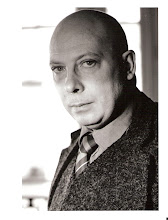
"Last night on earth" - Synopsis
« LAST NIGHT ON EARTH »
11 septembre 2001. Alors qu’à l’autre bout du monde la chute des deux tours du WTC sème le chaos dans les relations internationales, à Bruxelles se produit simultanément un drame à une échelle si minuscule que personne ne la voit, à savoir le drame de Max. Rongé par un sentiment d’échec à tout point de vue, il décide de mettre fin à ses jours. Mais avant de mourir, il veut laisser une trace de son passage sur terre. Pour ce faire, il contacte Bud, son meilleur ami, afin que celui-ci le filme durant ses vingt-quatre dernières heures de vie, qui signifieront une traversée de sa ville natale, de jour et de nuit, mais aussi une traversée de son existence passée sur terre. Ainsi, au cours de ses pérégrinations dans la ville, il réglera ses comptes avec la société, avec les notions d’amour et de guerre, avec Dieu et toute l’humanité. Mais dans la foulée, le voilà qui tombe nez à nez avec Carla, son ex-épouse, qui lui fera une révélation des plus saisissantes… à propos de Bud. Et alors qu’il sauve une fille en chaise roulante de l’emprise d’un maquereau, Max réalise qu’il n’a pas pris la bonne décision en se levant ce matin-là. Mais n’est-il pas déjà trop tard pour faire marche arrière ?
Daphnis Boelens, février 2008.
Article : Variety
LAST NIGHT ON EARTH (Variety) |
| |
| JUSTIN CHANG Virtuosity and ineptitude jockey for position in "Last Night on Earth," with the former coming out ahead --- just barely. Heavily improvised and shot over a single 18-hour period in Brussels, French-language pic is billed as "a film without limits," but the pretension and lack of discipline displayed show limits can be good. Still, sleek 70-minute debut feature from 25-year-old director, co-writer and actor William August (who has a producing credit under pseudonym Giles Daoust) is fascinating almost in spite of itself. Interest may depend on how effectively marketers can play up this reasonably accessible experiment's considerable spontaneity and daring. As might be guessed from its title, pic purports to be an account of one man's final 24 hours. Max (Pierre Lekeux) is a middle-aged Belgian who is so mad at the world he buys a gun to commit suicide. Before he does the deed, however, he asks his best (maybe only) friend, Bud (August), to follow him around the streets of Brussels with a digital camera, recording his last day as a sort of embittered testimony by a man who feels let down by society. Thus, except for a few moments when Bud sets down his camera so that he can enter the frame and talk to his subject, "Last Night on Earth" is lensed entirely from August's perspective. Press notes describe the result as "an almost Dogma movie," and although it breaks some of the rules, it also scrupulously obeys others, particularly its strict reliance on natural lighting. Pic could very accurately be called a Dogma 95 mockumentary, with all the brilliance and incompetence that the term suggests. First half is essentially an extended rant against God and the human race. At one point, Max's rage boils over and he directs his invective at the camera, even chasing Bud through a park before collapsing in angry exhaustion. Most of the time, however, Bud simply follows Max and watches him confront the people who have allegedly screwed him over. First on the list is Max's balding tyrant of a boss (Dan Sluijzer), whom Max meets in what may be the film's worst scene, with their confrontation full of mock-fascist dialogue like "You only exist because I allow you to exist." The camera is rarely an impassive observer in these moments, as August and co-editor Michel Afota deploy all manner of gimmicks --- jump-cutting, cross-cutting, fading to white, even altering the aspect ratio --- anything to jazz up a scene. Effect aims for a sub-Godardian playfulness but ultimately undercuts the helmer's intent, which is to show reality captured on the fly. In the next confrontation, between Max and his ex-wife, Carla (Muriel Ferrer), a shocking revelation completely alters, perhaps even destroys, what the film previously stood for. Though blatantly melodramatic, twist nonetheless leads to pic's most rewarding passage, during which Max, for once, remains almost completely silent. Lekeux's performance is remarkably deft throughout, effortlessly holding the camera's attention and subtly turning auds' initial revulsion into sympathy. Pic also benefits enormously from the third-act appearance of Melinda (Caroline Veyt), a kind, wheelchair-bound woman who forces Max to reconsider his decision. Pic's borderline-laughable dialogue is poorly served by its extremely shoddy subtitles, which contain more errors in spelling and grammar than can be counted in a single viewing. -- (BELGIUM) A Title Films presentation of a Title Films/Bad Fourteen Pics production. Produced by Giles Daoust. Executive producers, Alain Berliner, Serge Peffer. Directed by William August. Screenplay, August, Daphnis Boelens. Camera (color, DV), August; editors, Michel Afota, August; music, August; sound, Pierre Bachy. Reviewed at Hollywood Film Festival, Oct. 16, 2004. Running time: 70 MIN. Max ..... Pierre Lekeux Bud ..... William August The Boss ..... Dan Sluijzer Carla ..... Muriel Ferrer Melinda ..... Caroline Veyt The Soldier ..... Daphnis Boelens The Husband..... Stefan Sattler Copyright © 2003 Reed Business Information, a division of Reed Elsevier Inc. Variety is a registered trademark of Reed Elsevier Properties Inc. and used under license. All Rights Reserved. |
